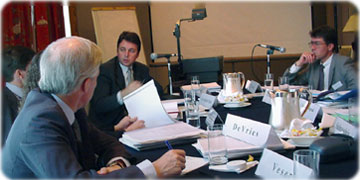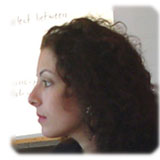Decision Makers 2010
Building Sustainability in a Globalized World
Conference
June 7-10, 2000, Hong Kong
Executive Summary
Program & Real Audio Presentations
Participants
Picture Gallery
Art Gallery
Word-Download: Executive Summary in German
|
Decision Makers 2010 Building Sustainability in a Globalized World Conference June 7-10, 2000, Hong Kong Executive Summary Program & Real Audio Presentations Participants Picture Gallery Art Gallery Word-Download: Executive Summary in German |
|||||
| |
Summary Working Group 1 Political Legitimacy in a Globalized World Listen also to the rapporteur Joop de Vries Summary (21:36 min)  Working Group 1 focused on the question of how it could be possible to build global legitimacy without a world-wide democracy or government. It is the gap between globalization and political legitimacy in the present and future world that puts this question on the agenda. The circumstances which led to this situation are outlined by the working paper "Innovation and Social Stability - Competition and Cooperation in the 21st Century" of the Research Group on the Global Future. Political legitimacy: an increasingly important issue all over the world The relevance of this topic discussed at the conference "Decision Makers 2010" in Hong Kong has somewhat been highlighted by the conference "Progressive Governance for the 21st Century", held a few days earlier in Berlin by the government heads of some - more or less - social-democratically governed states. They too perceived this as one of the most urgent problems and emphasized the need for more political steering in the global economy. The background of this - late - initiative has been the fear of global capitalism promoting only those people, which are able to handle successfully the new conditions of live, have enough money and are educated well. In this context, the apprehension has been made that democratic political institutions are loosing influence in favor of new political actors like powerful companies, Non-Governmental Organizations (NGO's) and pressure groups. However, unlike elected parliaments, governments or political parties, they have no equivalent political legitimacy. Under the chairmanship of Jürgen Turek, Director of the Research Group on the Global Future, the working group started with an overview of the character of legitimacy in a democratic state. Political legitimacy is the result of transparency, efficiency and democracy. The central question in this context is how strong and far-reaching globalization and technological change will touch upon societies, nation states and national economics. The research group's working paper "Innovation and Social Stability - Competition and Cooperation in the 21st Century" describes three fundamental developments which directly result from globalization and new technologies:
The doubly painful way of transition from communistic decision making structures to both a democratic supranational and a global decision making system: Slovakia as a case study  Ivan Miklos, former Deputy Premier
of the Government of Slovakia, prominent member of the political opposition
and founder of MESA 10, a successful and influential Think Tank based in
Bratislava, kicked-off the debate with a short presentation of Slovakia's
way in a globalized world [listen
to his presentation]. After the fall of the Berlin wall, the country
has to shoulder a double task: the transition to democracy and market economy
on the one hand, and the preparation of membership in the EU and the institutions
of the international system on the other. He described the enormous difficulties
Slovakia has faced on its way to capitalism and privatization, to free mass
media and free speech, to non-discrimination against ethnical minorities
and to squelch democracy. He made aware that the country will have to adapt
to a new kind of decision making on a multilateral level and in the institutional
framework of an increasingly globalized world. In this context, Slovakia
will be confronted constraints of global acting.
Ivan Miklos, former Deputy Premier
of the Government of Slovakia, prominent member of the political opposition
and founder of MESA 10, a successful and influential Think Tank based in
Bratislava, kicked-off the debate with a short presentation of Slovakia's
way in a globalized world [listen
to his presentation]. After the fall of the Berlin wall, the country
has to shoulder a double task: the transition to democracy and market economy
on the one hand, and the preparation of membership in the EU and the institutions
of the international system on the other. He described the enormous difficulties
Slovakia has faced on its way to capitalism and privatization, to free mass
media and free speech, to non-discrimination against ethnical minorities
and to squelch democracy. He made aware that the country will have to adapt
to a new kind of decision making on a multilateral level and in the institutional
framework of an increasingly globalized world. In this context, Slovakia
will be confronted constraints of global acting.Fit for globalization? Differences in development and the need for new cooperative structures The states of this world are differently fit for the survival in a global world; their political, economic and societal performance differs very strongly. How far will differences in development hinder states to participate successfully in a globalized world? The workshop's participants brought in different views, experiences and expectations from their own countries such as Japan, Thailand, Germany, Persia or the Netherlands. Although the group did not share a homogenous vision of the path from national relationships to more common global acting, all members agreed on the necessity of new linkages between conventional and new actors and institutions in international politics. This led to the issue of a useful political architecture: the linkages must be organized vertically (between global, regional, national and local actors) and horizontally (between actors on local level, actors on regional level and actors on global level). The group stressed the enormous importance of common values and rules in such forms of new cooperation. The main, but not answered question in this context is, whether it is possible to define a common value base that could serve as a platform for global cooperation. There are two alternatives to organize a new political architecture. Either, efforts could lead to create some form of "Global Governance" or even "Global Government". Or, the framework of conventional international relations can persist, which, however, is neither transparent, efficient nor democratic. The working group shared the view that the decision for either "Global Government" or "Global Governance" is dependent on 'realistic' or 'idealistic' calculations, values and principles. Because of the high pressure of global and technological change, demographic growth, migration, violence and environmental problems all participants of the discussion did not see a viable alternative to more political action on a global level. However, the goal can under no circumstances be the creation of a sprawling world bureaucracy of the familiar pattern. Global governance must be limited to the safeguarding of peace, the guaranteeing of human rights, a long-term cultivation of global public assets and a common regulation of competition and non-discrimination. In the face of the great variety of cultures, political systems and conceptions of social order, only such a limited model makes sense. Nevertheless, it will be difficult enough to formulate a cross-section of regulations which will be binding for all. The linkage between globalization and technological change Not only the increasing intermeshing of societies calls for new political concepts, new technologies change the conditions behind political activity, too. Intermeshing and new technologies are closely related to one another and cannot be analysed separately. For instance, the digitalization of information technology was - and is - the motor of globalization. Globalization, however, is at the same time the motor of further developments in information technology, through the global competition in the sector of technological innovation. The effects of intermeshing, interdependency and susceptibility to disturbances as well as the limits of political control and new constellations of power are very closely connected to the application and the effects of new technologies. They represent new challenges for political activity. At the same time, however, they offer solutions for problems arising from them. If consciously and consequently applied, they can contribute towards the legitimacy of politics.  In
the following session, Beth Noweck,
Director of International Programs of the Information Society at Yale School,
gave a short kick-off [listen
to her presentation]. Her main question: Does the Internet, as a global
and interactive communications medium, enhance or destroy global democratic
legitimacy? Her reply: Technology is both the problem as well as part of
the solution to the creation of horizontal and vertical legitimacy. In
the following session, Beth Noweck,
Director of International Programs of the Information Society at Yale School,
gave a short kick-off [listen
to her presentation]. Her main question: Does the Internet, as a global
and interactive communications medium, enhance or destroy global democratic
legitimacy? Her reply: Technology is both the problem as well as part of
the solution to the creation of horizontal and vertical legitimacy.The Internet I: destroying democratic legitimacy The Internet and computer networks are destroying democratic legitimacy because they erode national sovereignty and national law. The Internet glosses over cultural differences and ignores cultural particularity, in particular through the export of commercial U.S. values. It divides by class and age not by nationality or geography and hence it is undemocratic in spirit. Furthermore, features of the Internet are impediments to building legitimacy: the net is too connected, too fast and often does not really transport true information and knowledge. It is too individualized and there is no commitment to the conversation. The result is a hyper-speed cacophony. Everybody is speaking, no one is listening. If everybody is a broadcaster, no one is a viewer. The Internet II: force to enhance democracy Nevertheless, the Internet also seems to enhance democratic legitimacy. It is a global communications medium creating new community ties. It lays bare the inconsistencies of national regulations and opens up closed and repressive regimes to new ideas. In any case, it is an unprecedented learning tool and education vehicle, offering access to information and creating knowledge. It improves the organizational abilities of local communities and empowers small groups without much money and resources. Furthermore, it has been part of the success of the NGO movement today. The net seems to be a legitimizing force that thrives, enjoys cross-cultural acceptance, bridges cultural, legal and political differences recognized as a stable and lasting. On the whole, the Internet is democratic because communication is the core value of democracy. Conditions for making the net utilizable for the creation of political legitimacy In sum: on the one hand, the Internet is eroding traditional and legal authority. On the other hand, it highlights other sources of legitimacy besides national government and law. It teaches us alternative sources for political legitimacy. However, it also creates the need for new forms of political control and regulation. National laws on obscenity, indecency or hate speech are inadequate to deal with global networks. The increasing influence of corporations who control access to and determine the pricing of networks puts the power in the hands of democratically unaccountable organizations. In this context, technology can by itself not be the solution to regulate the change. Democracy is a political and not technological form of organization, that is based on political values. Therefore, it is necessary to get the rules right, to set standards and principles, and to create a 'vertical' mechanism for regulating guaranteed access, commitment to free speech, privacy and the prevention of censorship by either government or market. In addition, it is vital to build architectures and technologies that promote the values of global legitimacy, efficiency, transparency and participation. For this task, one can harness the possibilities and flexibility offered by the available technology. There is a need to create tools that promote political participation, enfranchisement and individual choice, encourage free speech and privacy, recognize cultural differences and pluralism. One has to recognize that the demise of civil society and absence of global democracy is not an inevitable casualty of the information age, but a casualty lost on the way, which might have been avoidable. The Internet both as tool and source of democratic legitimacy? The working group reached the conclusion that the net is more a tool than a source of democratic legitimacy. Today, one of the main questions is access to the net and thus, access to information and knowledge. Statistics of the United Nation Developing Program show that 91 percent of the world-wide Internet users belong to the OECD-countries with 19 Percent of the world population. Hence, the question for many countries of the world is first of all one of enabling people to use the net successfully. Therefore, education, technological support and financial help is the pre-condition for the enhancement of legitimacy in developing countries. An important question is whether mass media, Internet and new information technologies can help to steer the new economies and the economic behavior of companies. Here the group's discussion took a turn back to its starting point: the need for more political steering and control in a world shaped by globalization. Executive Summary | Program |
||||
Project Background | Events | Reports and Essays Zukunftszeugen | Contact Us | Home Page Last Modified: 2002-04-23 TOP |
|||||